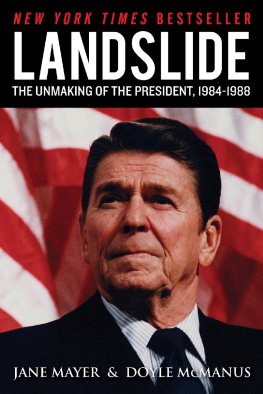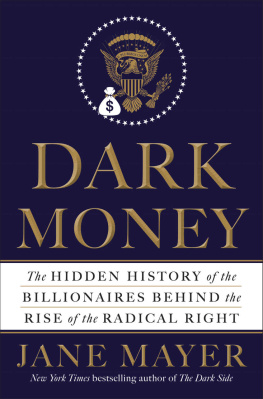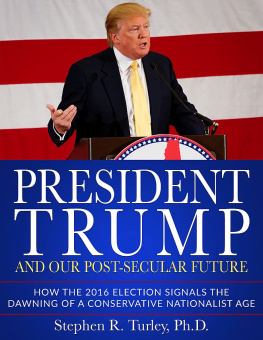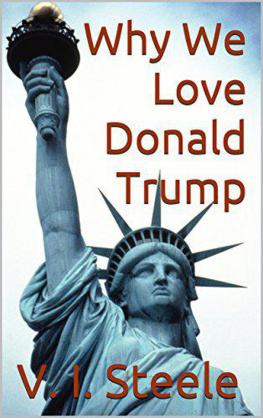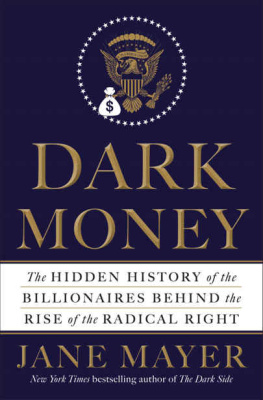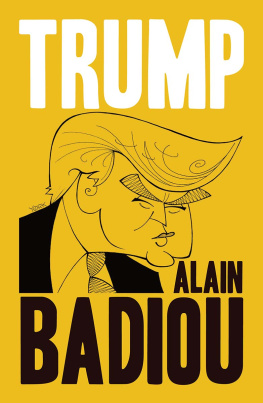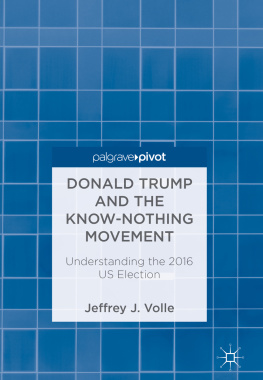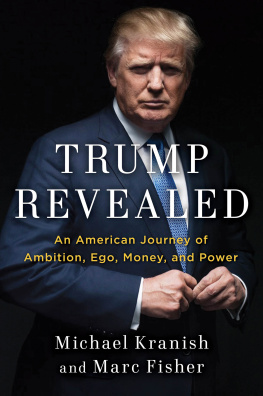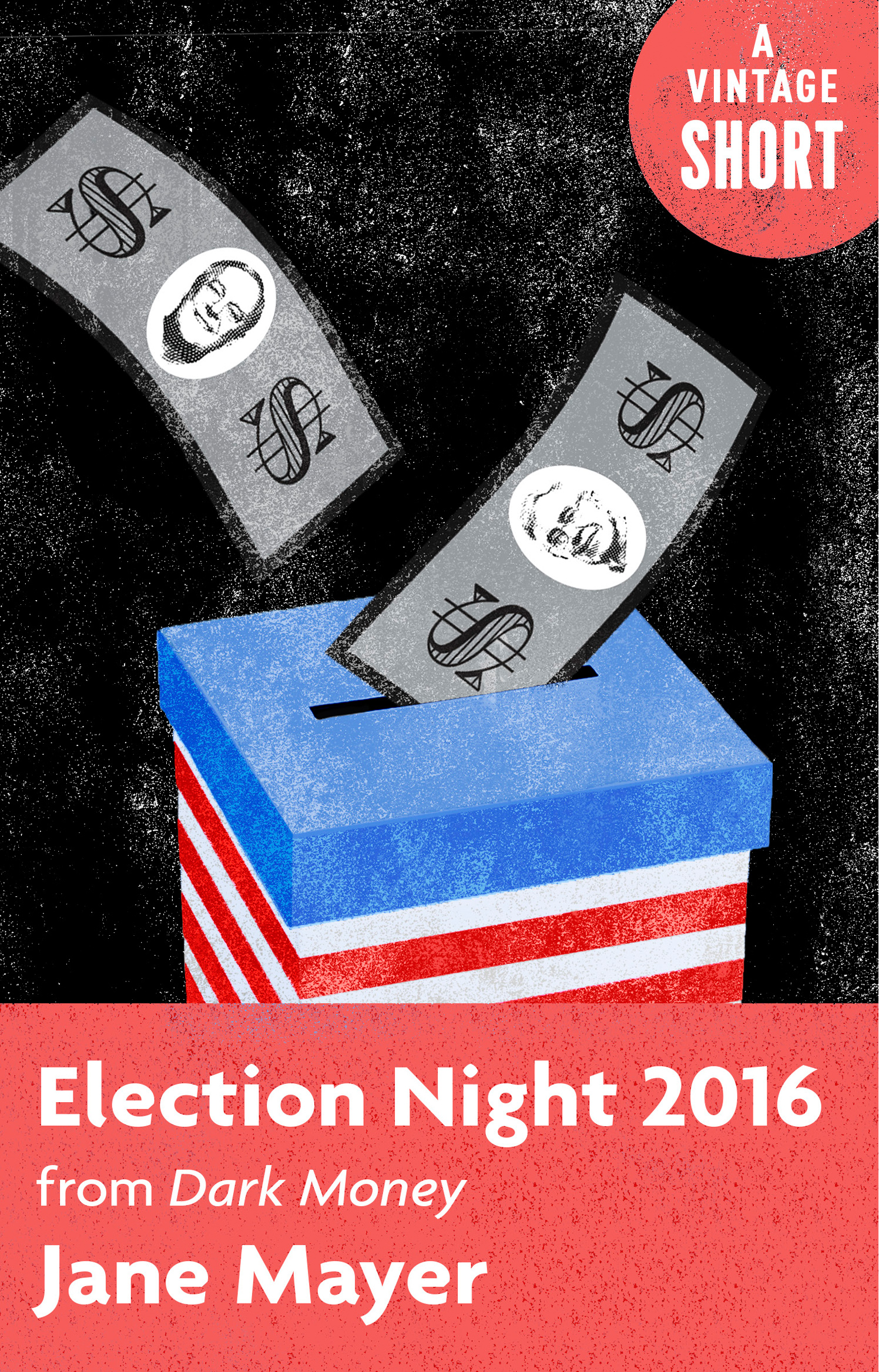Election Night 2016
from Dark Money
by Jane Mayer
A Vintage Short
Vintage Books
A Division of Penguin Random House LLC
New York
Copyright 2017 by Jane Mayer
All rights reserved. Published in the United States by Vintage Books, a division of Penguin Random House LLC, New York, and in Canada by Random House of Canada, a division of Penguin Random House Canada Limited, Toronto. Originally published in the United States as part of Dark Money by Anchor Books, a division of Penguin Random House LLC, New York, in 2017.
Vintage and colophon are registered trademarks of Penguin Random House LLC.
The Cataloging-in-Publication Data for Dark Money is available from the Library of Congress.
Ebook ISBN9780525566601
Cover design by Linda Huang
www.vintagebooks.com
v5.3.2
a
Contents
Election night 2016 was a stunning political upset auguring a new political order in almost every respect. Donald Trump, a billionaire businessman with no experience in elected office, running on a promise to upend the status quo, defeated Hillary Clinton, the designated heir to Barack Obamas Democratic presidency. Trumps triumph defied the predictions of almost every pundit and pollster. It rocked the political establishments in both parties and sent shock waves around the globe. Markets trembled before recovering their equilibrium. The political world seemed to shift on its axis, spinning toward an unknown and unpredictable future. Although Trump ran as a self-proclaimed outsider against what he portrayed as entrenched and corrupt political elites, there was an unexpectedly familiar representative of this moneyed class at his victory party in Manhattan. Standing with a jubilant smile amid the throng of revelers at the Hilton hotel in midtown Manhattan was David Koch.
During the presidential primaries, Trump had mocked his Republican rivals as puppets for flocking to the secretive fund-raising sessions sponsored by David Koch and his brother Charles, co-owners of the second-largest private company in the United States, the Kansas-based energy and manufacturing conglomerate Koch Industries. Affronted, the Koch brothers, whose political spending had made their name almost shorthand for special-interest clout, withheld their financial support from Trump. As a result, the story line adopted by many in the media was that the Koch brothers in particular, and big political donors in general, were no longer a major factor in American politics. Trump had after all defeated far bigger-spending rivals, including Clinton.
It might be nice to think the era of big money in American politics is over, but a closer look reveals a far more complicated and far less reassuring reality.
Trump had indeed campaigned by attacking the big donors, corporate lobbyists, and political action committees that have come to dominate American politics as very corrupt. In doing so, he fed into a national, bipartisan outpouring of disgust at the growing extent to which campaigns have become little more than relentless pursuits of obscene amounts of cash. To the surprise of many, Trump and Bernie Sanders, the left-wing insurgent who challenged Clinton in the Democratic primaries, seemed to transform big political money from an advantage into a liability. Trump nicknamed Clinton Crooked Hillary, claiming that she was 100% owned by her donors. By Election Day, the publics trust in her was in tatters.
Improbably, Trump, a New York businessman who had global financial interests and who spent some $66 million of his own fortune to get elected, ran against Wall Street. He successfully positioned himself as pristine because he was a billionaire in his own right, rather than one beholden to other billionaires. In a tweet less than a month before the election, Trump promised, I will Make Our Government Honest Againbelieve me. But first Im going to have to #DrainTheSwamp. His DrainTheSwamp hashtag became a rallying cry for supporters riled by the growing economic inequality in the country and intent on ending corruption in Washington, which they blamed for putting the interests of the rich and powerful over their own.
Yet as Ann Ravel, a Democratic member of the Federal Election Commission who had championed reform of political money for years, observed just days after Trumps election, instead the alligators are multiplying.
Despite having been elected as a populist outsider, Trump put together a transition team that was crawling with the kinds of corporate insiders he vowed to disempower. Especially prominent among them were lobbyists and political operatives who had financial ties to the Kochs. This was perhaps unexpected, because the Kochs had continued to express their distaste for Trump throughout the campaign. Charles Koch called himself a libertarian. He supported open immigration and free trade, both of which benefited his vast multinational corporation. He had denounced Trumps plans to bar Muslim immigrants as monstrous and frightening.
Yet there were signs of a rapprochement. The chair of Trumps transition team, Vice President elect Mike Pence, had been Charles Kochs first choice for the presidency in 2012 and a major recipient of Koch campaign contributions. David Koch had personally donated $300,000 to Pences campaigns in the four years before Trump chose Pence as his running mate. Pence, who in the past had shared the Kochs enthusiasm for privatizing Social Security and denying the reality of climate change, had been a featured guest at a fund-raiser that David Koch hosted for about seventy of the Republican Partys biggest political donors at his Palm Beach, Florida, mansion in the spring of 2016. He had also been slated to speak at the Kochs donor summit in August 2016 but canceled after joining the Republican ticket. Meanwhile, Pences senior adviser in the sensitive task of managing Trumps transition to power was Marc Short, who just a few months earlier had actually run the Kochs secretive donor club, Freedom Partners. This was the same elite group whose meetings Trump had ridiculed during the campaign.


